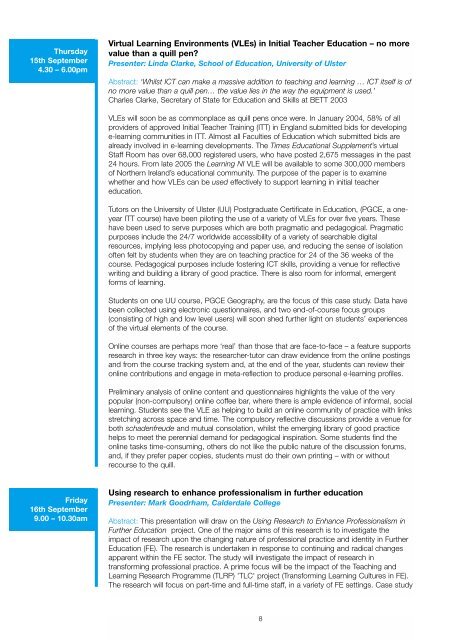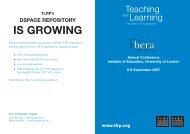Bera Booklet 2005 - Teaching and Learning Research Programme
Bera Booklet 2005 - Teaching and Learning Research Programme
Bera Booklet 2005 - Teaching and Learning Research Programme
- No tags were found...
Create successful ePaper yourself
Turn your PDF publications into a flip-book with our unique Google optimized e-Paper software.
Thursday15th September4.30 – 6.00pmVirtual <strong>Learning</strong> Environments (VLEs) in Initial Teacher Education – no morevalue than a quill pen?Presenter: Linda Clarke, School of Education, University of UlsterAbstract: ‘Whilst ICT can make a massive addition to teaching <strong>and</strong> learning … ICT itself is ofno more value than a quill pen… the value lies in the way the equipment is used.’Charles Clarke, Secretary of State for Education <strong>and</strong> Skills at BETT 2003VLEs will soon be as commonplace as quill pens once were. In January 2004, 58% of allproviders of approved Initial Teacher Training (ITT) in Engl<strong>and</strong> submitted bids for developinge-learning communities in ITT. Almost all Faculties of Education which submitted bids arealready involved in e-learning developments. The Times Educational Supplement’s virtualStaff Room has over 68,000 registered users, who have posted 2,675 messages in the past24 hours. From late <strong>2005</strong> the <strong>Learning</strong> NI VLE will be available to some 300,000 membersof Northern Irel<strong>and</strong>’s educational community. The purpose of the paper is to examinewhether <strong>and</strong> how VLEs can be used effectively to support learning in initial teachereducation.Tutors on the University of Ulster (UU) Postgraduate Certificate in Education, (PGCE, a oneyearITT course) have been piloting the use of a variety of VLEs for over five years. Thesehave been used to serve purposes which are both pragmatic <strong>and</strong> pedagogical. Pragmaticpurposes include the 24/7 worldwide accessibility of a variety of searchable digitalresources, implying less photocopying <strong>and</strong> paper use, <strong>and</strong> reducing the sense of isolationoften felt by students when they are on teaching practice for 24 of the 36 weeks of thecourse. Pedagogical purposes include fostering ICT skills, providing a venue for reflectivewriting <strong>and</strong> building a library of good practice. There is also room for informal, emergentforms of learning.Students on one UU course, PGCE Geography, are the focus of this case study. Data havebeen collected using electronic questionnaires, <strong>and</strong> two end-of-course focus groups(consisting of high <strong>and</strong> low level users) will soon shed further light on students’ experiencesof the virtual elements of the course.Online courses are perhaps more ‘real’ than those that are face-to-face – a feature supportsresearch in three key ways: the researcher-tutor can draw evidence from the online postings<strong>and</strong> from the course tracking system <strong>and</strong>, at the end of the year, students can review theironline contributions <strong>and</strong> engage in meta-reflection to produce personal e-learning profiles.Preliminary analysis of online content <strong>and</strong> questionnaires highlights the value of the verypopular (non-compulsory) online coffee bar, where there is ample evidence of informal, sociallearning. Students see the VLE as helping to build an online community of practice with linksstretching across space <strong>and</strong> time. The compulsory reflective discussions provide a venue forboth schadenfreude <strong>and</strong> mutual consolation, whilst the emerging library of good practicehelps to meet the perennial dem<strong>and</strong> for pedagogical inspiration. Some students find theonline tasks time-consuming, others do not like the public nature of the discussion forums,<strong>and</strong>, if they prefer paper copies, students must do their own printing – with or withoutrecourse to the quill.Friday16th September9.00 – 10.30amUsing research to enhance professionalism in further educationPresenter: Mark Goodrham, Calderdale CollegeAbstract: This presentation will draw on the Using <strong>Research</strong> to Enhance Professionalism inFurther Education project. One of the major aims of this research is to investigate theimpact of research upon the changing nature of professional practice <strong>and</strong> identity in FurtherEducation (FE). The research is undertaken in response to continuing <strong>and</strong> radical changesapparent within the FE sector. The study will investigate the impact of research intransforming professional practice. A prime focus will be the impact of the <strong>Teaching</strong> <strong>and</strong><strong>Learning</strong> <strong>Research</strong> <strong>Programme</strong> (TLRP) 'TLC' project (Transforming <strong>Learning</strong> Cultures in FE).The research will focus on part-time <strong>and</strong> full-time staff, in a variety of FE settings. Case study8
















